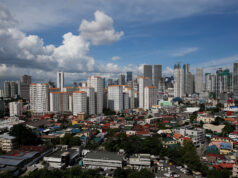THE PHILIPPINES can afford a fiscal expansion under the proposed P3.767-trillion 2018 budget to fund an ambitious infrastructure push given the positive medium-term macroeconomic outlook and tame inflation despite the peso’s weakness, economic managers said at a budget hearing yesterday.
Officials of the multiagency Development Budget Coordinating Committee made the comments yesterday in a macroeconomic situationer to the House committee on appropriations, which started deliberations on the P3.767-trillion budget, which is 12.4% greater than the current year’s appropriations.
Budget Secretary Benjamin E. Diokno said that a 3% budget deficit, wider than the 2% maintained by the previous administration, would allow the government to spend about P2.2 trillion more until 2022. “We decided to have an expansionary fiscal policy. This allows us for a bigger fiscal space to spend more,” he said.
Finance Secretary Carlos G. Dominguez III said the fiscal position is geared for aggressive spending over the medium term, amid improving revenue generated by the tax collection agencies.
“I am happy to report to you that from 2015 to 2016, we improved total revenues from P2.109 trillion to P2.196 trillion, which represents an improvement of 4.1%,” Mr. Dominguez told legislators during the hearing.
“Between now and 2022, with tax reforms and continuing improvement in tax administration, we are looking to improving the ratio of revenues to GDP (gross domestic product) from the current 15% to 17.7% in 2022. Tax revenues-to-GDP will increase from 13.7% in 2016,” he added.
As the government plans to spend P8.4 trillion on infrastructure over the medium term, Mr. Dominguez said that it need not resort to reckless borrowing.
The 2018 budget assumes P2.841 trillion in government revenue, equivalent to 16.3% of GDP and 17% more than the P2.427 trillion assumed in 2017, which was equivalent to 15.2% of GDP.
Disbursements meanwhile will increase by some 15.6% to P3.364 trillion, equivalent to 19.3% of GDP, against 2017’s P2.909 trillion, equivalent to 18.3% of GDP.
Of the disbursements, infrastructure spending is programmed to rise by 54.47% to P752.9 billion, equivalent to 4.3% of GDP, from this year’s planned P487.4 billion, or 3.1% of GDP.
Mr. Diokno added that the rise in debt will be outstripped by the robust GDP expansion. Debt-to-GDP this year is at 40.6%, and is projected to fall further to 37.7%.
Socioeconomic Planning Secretary Ernesto M. Pernia said that the country remains on track to hit the middle of its full-year target for growth, which is in a range of 6.5% to 7.5% this year.
Mr. Pernia noted a shift to an investment-led economy from one propelled solely by consumption. The government expects 7-8% growth next year until 2022 from 6.9% in 2016. It also projects a reduction in poverty incidence to 13-15% from 21.6% in 2015.
Despite the robust growth, the Bangko Sentral ng Pilipinas (BSP) for its part is still confident that inflation will likely be held at the midpoint of its 2-4% target band this year until 2018.
“BSP remains optimistic that prospects of the domestic economy continue to be favorable as macro fundamentals remain intact. The inflation environment has remained manageable in the first six months in 2017. The latest inflation forecasts are close to the midpoint of our target range of 3% in 2017-2018,” BSP Governor Nestor A. Espenilla said.
“Ample liquidity to flow to the productive sectors of the economy, the continued resilience of the banking system has led to efficient financial intermediation and management of risks,” he added.
BSP deputy governor Diwa C. Guinigundo meanwhile downplayed concerns over the deficits the current account and balance of payments, noting that the hike in imports largely comprise capital goods, a sign that the manufacturing sector will ramp up its activity.
“This reflects sustained expansion in the domestic economy capital formation and expansion, sustained in the medium term. As investment growth accelerates it gears up for higher growth momentum.”
Mr. Guinigundo added that the tax reform program, which is awaiting committee approval in the Senate, will “preserve the economic gains we have achieved in the previous years” and will allow for more sustained domestic investment.
Economic managers said that despite the increase in borrowing and the weakening of the peso, debt will remain manageable given the declining share of debt relative to GDP.
They said that with the weak peso, the private sector led by the business process outsourcing and overseas foreign workers remittances and will gain some P50 billion more, which will further bolster consumption spending.
The government side will meanwhile get an net P7.5 billion additional revenues as the additional P9.5 billion increase in customs collections will more than offset the, P2 billion increase in debt payments.
Legislators sought assurances that government agencies will utilize the funds allocated and avoid creating more project backlogs, which was blamed on the previous administrstion.
House deputy leader Rolando G. Andaya, Jr. and Kabataan party-list Representative Herminio L. Roque Jr. said they want to avoid a repeat of the left P1 trillion left unspent by the previous government.
Mr. Diokno however said that infrastructure spending is “on the dot,” and was confident that it will be sustained over the medium term due to tight supervision of government agencies. He said that there is active pressure on those agencies, which are told to “spend or lose your job.” Mr. Diokno even concluded that underspending is “a thing of the past.” The government saw its expenditures grew 28% in June, surpasing its program for that month.
On the borrowing side of the budget, Albay Rep. Edcel C. Lagman meanwhile flagged the loans committed by China for funding the government’s infrastructure projects, due to the possible endorsement of unreliable contractors. Mr. Dominguez said that despite the entry of foreign contractors in the bidding process as a condition of the loans, the government will exercise caution.
The House committee plans to approve the 2018 budget by end-August. — Elijah Joseph C. Tubayan



